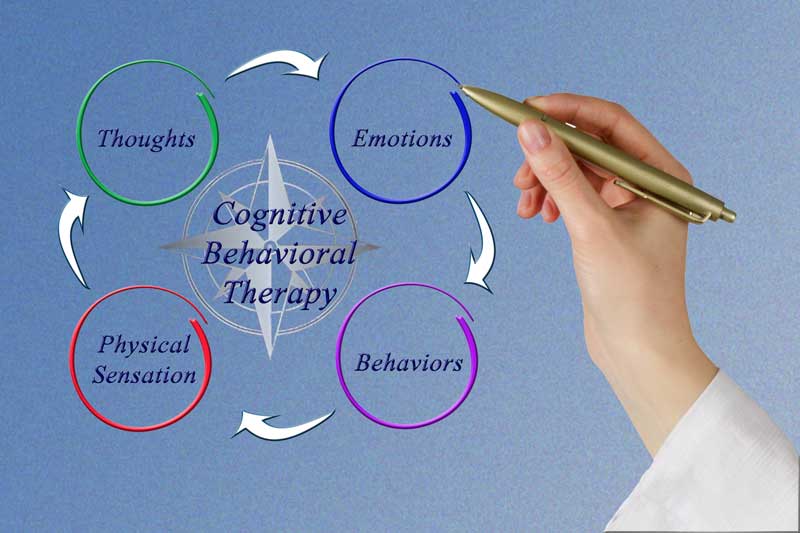Cognitive Behavioral Therapy (CBT)


313 West Liberty Street, Ste. 224
Lancaster, PA 17603

What Is Cognitive Behavioral Therapy (CBT)?

Cognitive Behavioral Therapy (CBT) is a type of talk therapy that helps you deal with uncomfortable feelings and thoughts, especially after experiencing Trauma or Post-Traumatic Stress Disorder (PTSD).
CBT focuses on how your thoughts, feelings, and actions are connected and teaches you how to change negative thoughts into more positive ones.
We will help you determine if CBT is the best therapy for your unique needs. We'll give you the highest-quality In-Person and Telehealth CBT Trauma and PTSD Therapy available in Pennsylvania.
Our Trauma and PTSD specialists will provide the services you need to get better and reclaim your life after Trauma.
You are not alone; healing is possible, and your healing starts here.
How Does CBT Therapy Work?
Cognitive Behavioral Therapy (CBT) is like learning to rewire your brain to think and act healthier. It's based on the idea that your thoughts, feelings, and actions are all connected.
- Understanding Your Feelings: We start by discussing your experiences and how they affect you. This discussion helps us understand what you’re going through.
- Spotting the Problem: CBT helps you identify negative or unhelpful thought patterns causing problems in your life. These could be things like:
- Always expecting the worst,
- Blaming yourself for everything, or
- Thinking in black-and-white terms
- Changing Negative Thoughts: You’ll learn to spot and challenge negative thoughts that make you feel worse. Once you've identified these negative thoughts, CBT teaches you how to challenge them. You learn to ask yourself:
- Is this thought true?
- Is there another way to look at this situation?
- What's the evidence for and against this thought?
- Facing Your Fears: Gradually, you’ll face memories or situations that make you anxious in a safe way, which helps reduce fear and anxiety over time.
- Learning New Skills: CBT also focuses on changing unhelpful behaviors you have linked to those negative thoughts and feelings. You’ll gain tools to manage stress and anxiety that you can use in everyday life. These tools might involve:
- Facing your fears instead of avoiding them.
- Trying new things and stepping outside your comfort zone.
- Practicing relaxation techniques
- Staying Strong: We’ll create a plan to help you keep making progress and handle any challenges that come up in the future.
Why Choose CBT for Trauma and PTSD?
- Proven to Work: Studies show that CBT is one of the best treatments for PTSD, helping many people feel better and live happier lives.
- Empowerment: CBT helps you take control of your thoughts and feelings, making you feel stronger and more confident.
- Quick Results: Many people start to feel better in just a few weeks, making CBT a fast and effective option.
- Personalized Care: ACRS therapists will work with you to create a plan that fits your unique needs and goals.
Who Can Benefit from CBT?
CBT is helpful for anyone who has gone through a traumatic experience, like veterans, survivors of abuse, or first responders. If you’re dealing with symptoms like flashbacks, nightmares, or feeling anxious, CBT can help you find relief.
Online Telehealth CBT Therapy
Is Online Telehealth CBT Therapy Effective?
- Research has shown that CBT Therapy can be effective when delivered through Online Telehealth. Many clients report positive outcomes similar to In-Person sessions.
- Therapists can accomplish the key components of CBT, such as Understanding Your Feelings; Changing Negative Thoughts; Facing Your Fears; Learning New Skills; and Staying Strong, online.
Safety and Comfort
- Online Telehealth allows you to engage in therapy from the comfort of your own home, which can enhance feelings of safety and security.
Accessibility
Online Telehealth makes CBT Trauma and PTSD Therapy more accessible to you if you have difficulty attending In-Person sessions due to geographical, physical, or logistical barriers.
Confidentiality and Security
Therapists must ensure that your Telehealth platform is secure and compliant with privacy regulations (such as HIPAA in the United States) to protect your confidentiality.
Therapist Training
- Therapists conducting Cognitive Behavioral Therapt (CBT) via Online Telehealth must be trained in both CBT Therapy and Telehealth technology. They should be familiar with adapting the CBT process to an online format.
CBT Certified Therapists at ACRS
Chief Executive Officer

- Licensed Professional Counselor (LPC);
- Pa. Lic. PC006514
- Fl. Lic. TPMC1044
- Certified Traumatologist (CT)
- National Certified Counselor (NCC)
- Certified Clinical Mental Health Counselor (CCMHC)
- Certified Clinical Trauma Professional (CCTP)
- Certified in Emergency Crisis Response (CECR)
- Master of Arts (MA)
- 20+ years of clinical experience.
- Worked with clients across the lifespan.
Chief Clinical Officer

- Licensed Professional Counselor (PA-015668);
- Certified Dialectical Behavioral Therapist (C-DBT);
- Certified Clinical Trauma Professional (CCTP); and
- Certified Dancing Mindfulness Facilitator (CDMF)
- Bachelor of Fine Arts (BFA)
Practiced in artistic expressionism, specifically dance and other performing arts.
Chief Administrative Officer

- Licensed Associate Professional Counselor (LAPC)
- Cognitive Processing Therapist (CPT)
Pre-licensed Clinician - Certified Grief Informed Professional (CGP)
Experience working with adolescents, couples, the elderly population, blended families, and families in the adoption process.
Take the First Step Towards Healing
Cheryl Wilson-Smith
Chief Executive Officer

- Licensed Professional Counselor (LPC);
- Pa. Lic. PC006514
- Fl. Lic. TPMC1044
- Certified Traumatologist (CT)
- National Certified Counselor (NCC)
- Certified Clinical Mental Health Counselor (CCMHC)
- Certified Clinical Trauma Professional (CCTP)
- Certified in Emergency Crisis Response (CECR)
- Master of Arts (MA)
- 20+ years of clinical experience.
- Worked with clients across the lifespan.
"I have over 20 years of experience in In-Person and Online Cognitive Behavioral Therapy (CBT). I guarantee that the CBT Trauma and PTSD Therapy ACRS provides to our clients is of the highest quality in Pennsylvania".

